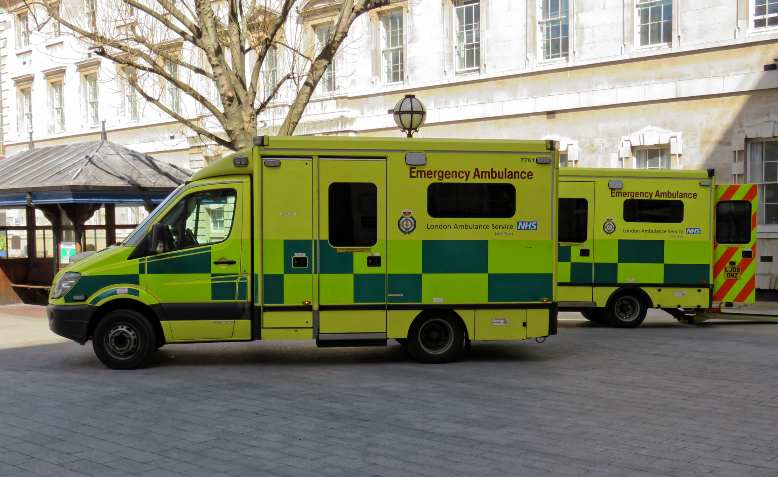 Ambulances at St Barts hospital. Photo: Wikimedia Commons
Ambulances at St Barts hospital. Photo: Wikimedia Commons
The impact of Covid-19 on BAME groups is magnifying the pre-existing structural inequalities in society, argues Alyssa Cassata
Meaningless platitudes suggesting “we’re all in this together” have been thrown about by the government to deflect from their failure to act quickly and effectively in the face of the coronavirus crisis. This line allows them to ignore the emerging evidence demonstrating that the effects of Covid-19 are disproportionately impacting BAME communities. While it’s true that the virus itself does not discriminate, it has clearly highlighted pre-existing inequalities in society that must be addressed; we cannot allow for a return of “business as usual” when the crisis is over.
Official figures revealed that 72% of health and social care staff that have died from coronavirus are from ethnic minorities, they also make up 34% of critically ill patients, despite accounting for just 14% of the population. These disparities undeniably expose the results of systemic discrimination that has been rooted in society for years and manifested in unnecessary and tragic deaths throughout this pandemic. Although shocking, these figures are unsurprising when given context. A report from the Department of Health in 2009 found that, of NHS patients, BAME groups are “less likely to report a positive experience” and “tended to be less positive about questions relating to ‘access and waiting’”.
Additionally, BAME doctors are twice as likely to not complain about safety as they are more likely to be subject to disciplinary action and more likely to be harassed or bullied by managers. The inequalities currently making headline news aren’t new and must not be forgotten when the pandemic is over.
Similarly, the government’s failure to record the ethnicity of coronavirus patients is unacceptable; any failure to record and publish data could allow the government to ignore the structural discrimination BAME communities face that is being made even clearer from data emerging due to Covid-19. Furthermore, Dr Chaand Nagpaul of the British Medical Association stated that “We’re well aware that doctors have been under pressure to see patients but have not felt adequately protected, with shortages of PPE” - this issue disproportionately impacts BAME doctors who are less likely to feel that they can speak out and have reported that they feel targeted to work on coronavirus wards.
More generally, the effects of the pandemic and imposed lockdown are having a bigger impact on ethnic minorities due to structural racism. Research conducted by the TNI last year revealed that BAME workers are subject to insecure work as they are significantly more likely to be on zero-hour contracts where pay is typically a third less an hour than those on permanent contracts, they are also twice as likely to report not having enough hours to cover basic needs, and 1 in 13 BAME workers were reported to be in temporary work. Additionally, a government report stated that “White British households were less likely to be overcrowded than households from all other ethnic groups combined” which has clear implications for social distancing.
These deep-rooted inequalities have been proliferated by the virus and have resulted in countless preventable deaths, impacting thousands of families. These issues cannot go unaddressed by the government and require much more action than the formal pandemic review on BAME deaths launched by the Department of Health and Social Care, led by NHS England, clearly ignoring a possible conflict of interest. The aforementioned issues call for structural change that will not be addressed by the proposed review.
Arguments suggesting that biological factors explain the disproportionate impact of coronavirus on ethnic minorities are baseless pseudo-scientific ideas and allow the structural racism ingrained in society to be overlooked and should be vehemently refuted. The issues emphasised by the coronavirus pandemic are a result of systemic discrimination that cannot be ignored when the crisis subsides.

